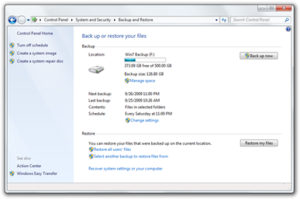Windows Backup
| A component of Microsoft Windows | |
|---|---|

Backup and Restore in Windows 7
|
|
| Details | |
| Other names | Windows Backup and Restore Center Windows Backup Windows 7 File Recovery System Image Backup |
| Type | Backup software |
| Included with |
Windows Vista Windows Server 2008 Windows 7 Windows Server 2008 R2 Windows 8 Windows 10 |
| Replaces | NTBackup |
| Replaced by | File History (partially) |
| Service name | Windows Backup (SDRSVC) |
| Description | Provides Windows Backup and Restore capabilities. |
| Support status | |
| Active | |
| Related components | |
|
Shadow Copy System Restore wbadmin Windows Recovery Environment |
|
Backup and Restore (formerly Windows Backup and Restore Center) is a component of Microsoft Windows introduced in Windows Vista and included in later versions that allow users to create backups and restore from backups created earlier. It is a replacement of NTBackup, which was included in previous Windows versions. It became a deprecated feature in Windows 8 before being completely removed in Windows 8.1 in favor of File History. However, in Windows 10, it was re-incorporated into the operating system.
There are two different types of backup supported: File backup and system image. File backups are saved to ZIP files. Two methods of file backup are supported: The first, normal backup, stores everything selected for backup. The second, incremental backup stores only files that are changed after a previous backup. The other method of backup, system image, is a disk image of the backed up system saved block by block in a VHD file (versus file by file in the file backup and NTBackup). Block-based backup is more efficient at performing subsequent differential backups, as only the blocks that have changed need to be backed up.
During a backup, Windows uses Volume Shadow Copy Service to ensure that files are not changed while they are being backed up. VSS ensures both file system level consistency as well as application-level consistency for applications registered as VSS writers. Newer backup media such as CD, DVD, and Blu-ray discs are supported in Backup and Restore.
Windows Backup service is the Windows service responsible for backup and restore operation. The Backup and Restore application, however, is not the only way of interfacing with this service: The Wbadmin command-line utility may also be used.
...
Wikipedia
